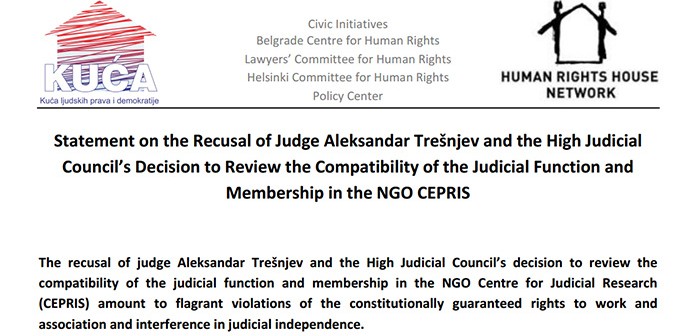The recusal of judge Aleksandar Trešnjev and the High Judicial Council’s decision to review the compatibility of the judicial function and membership in the NGO Centre for Judicial Research (CEPRIS) amount to flagrant violations of the constitutionally guaranteed rights to work and association and interference in judicial independence.
Belgrade Higher Court President Aleksandar Stepanović issued a ruling on 16 June 2016 recusing judge Aleksandar Trešnjev from the judicial panel ruling on the criminal case K-Po1 36/2015. The ruling specifies that Trešnjev is recused because he is a member of the CEPRIS. The counsel of the defendant in the case, attorney Vladimir Beljanski is also a member of CEPRIS, which is headed by Beljanski’s father. The Court President found that all these circumstances raised doubts about judge Trešnjev’s impartiality.
On 1 July 2016, High Judicial Council (HJC) Chairman Dragomir Milojević scheduled a regular HJC session for 15 July 2016. The tenth of the 12 items on the Agenda is the review of the compatibility of the judicial function and membership in CEPRIS.
The Serbian Constitution guarantees the freedom of association and sets limits for judges, prohibiting their membership in political parties, whilst specifying that the functions, duties and private interests incompatible with the judicial function shall be governed by law (Articles 55 and 152). Under the Act on Judges, judges may associate in professional associations with a view to protecting their interests and preserving their professional independence and autonomy (Article 7).
Under CEPRIS’ Statute, this NGO is an independent, voluntary, non-profit, non-government organisation involved in the research, study and improvement of the judiciary in a democratic society based on the rule of law and separation of powers, established with a view to creating conditions for the independent or autonomous status and professional, impartial and efficient work of the judiciary in an open democratic society, based on the principles of the rule of law and separation of powers. CEPRIS researches the content and enforcement of regulations governing the judiciary, problems arising in judicial practice and proposes and takes measures to eliminate them.
The very fact that a judge and an attorney are members of a professional association aiming at improving the status and work of the judiciary cannot and may not be perceived as grounds raising doubts about the judge’s impartiality. The interpretation reducing professional associations in the Act on Judges to associations comprised exclusively of judges and the thesis that “it is impossible that the courts and lawyers or courts and public prosecution services together advocate the independence, impartiality and autonomy of courts and judges” are inadmissible, untenable and, to say the least, insulting to the reputation of prosecutors and attorneys.
Furthermore, CEPRIS does not differ in any way from other professional associations rallying judges, attorneys and prosecutors (e.g. the Association of Legal Professionals of Serbia or the Serbian Criminal Law and Practice Association), which gives rise to concerns why membership in such associations has not raised doubts about the impartiality of the judges, who are their members, as opposed to membership in CEPRIS.
We hereby alert the public to the review of the (in) compatibility of the judicial function and CEPRIS membership scheduled for 15 July 2016. The HJC is not authorised to review the incompatibility of other duties and offices and the judicial function in abstracto; rather, it is authorised to review only the incompatibility of the judicial office of a specific judge and his/her specific duty or function. The phrasing of Item 10 on the Agenda – that the HJC will rule on the compatibility of a judicial function and CEPRIS membership – indicates that this body will assess the compatibility of the functions of all judges who are members of professional associations, in the absence of legal grounds. Such an interpretation would greatly limit the scope for exercising the right to freedom of association.
The recusal of a judge because of his/her membership in a professional organisation involved in improving the situation in the judiciary and the decision to review the compatibility of a judicial function and membership in the NGO CEPRIS are in contravention of the fundamental constitutional guarantees to work and association and amount to an interference in the independence of the judiciary. Even more so on the eve of the opening of negotiations between Serbia and the EU on Chapter 23 on the judiciary and fundamental rights which, inter alia, includes judicial independence and the freedom of association.





